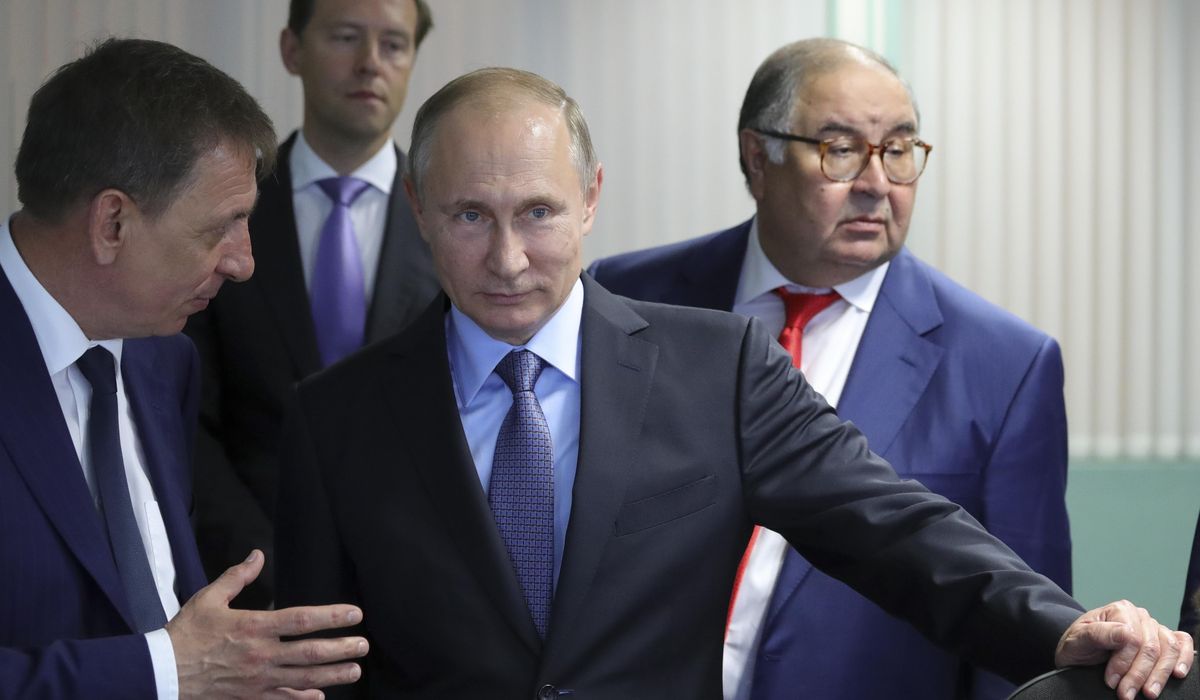
The Biden administration on Friday joined the European Union in sanctioning Russian President Vladimir Putin and Foreign Minister Sergey Lavrov personally as punishment for Moscow’s devastating invasion of Ukraine.
The administration also sanctioned Russian Minister of Defense Sergei Shoigu, Russian military chief Valery Gerasimov, and 11 members of the Russian Security Council.
Under the sanctions, Mr. Putin, Mr. Lavrov and the other elites will have all of their U.S. assets frozen. They are also prohibited from doing business with U.S. entities.
They are also banned from traveling to the U.S.
It is extraordinarily rare for the U.S. to sanction a foreign leader, although it has been done. Most recently, the U.S. penalized Venezuela’s Nicolas Maduro and Syria’s Bashar al-Assad.
“Treasury is continuing to inflict costs on the Russian Federation and President Putin for their brutal and unprovoked assault on the people of Ukraine,” Treasury Secretary Janet Yellen said in a statement. “We are united with our international allies and partners to ensure Russia pays a severe economic and diplomatic price for its further invasion of Ukraine.”
Ms. Yellen said the U.S. is prepared to impose further sanctions if Russia does not back down in Ukraine.
The Biden administration has been ratcheting up sanctions against Moscow over the past few days, working with European allies in hopes of deterring Mr. Putin from attacking Ukraine.
Those efforts did little to stop Mr. Putin from advancing further into Ukraine, as Russian troops advanced closer to Kyiv. Now the goal of sanctions has shifted from persuasion to punishment.
The move comes hours after the European Union and the United Kingdom announced they would slap Mr. Putin and Mr. Lavrov with penalties.
“It has been under consideration and on the table for some time,” White House press secretary Jen Psaki said. “The president’s strong view and strong principle from the beginning of this conflict has been to take actions and steps in alignment with our European partners, and this is certainly evidence of that.”
On Friday, the EU and Britain announced they will freeze the assets belonging to the two Russian leaders in their countries. The sanctions are a part of a tranche of penalties announced by European countries.
Mr. Biden had repeatedly insisted that sanctioning Mr. Putin was “on the table,” but had been reluctant to pull the trigger. He did not answer questions from reporters on Thursday on why he avoided sanctioning Mr. Putin personally as he announced sanctions on Russian banks and oligarchs.
However, the EU will not ban Mr. Putin or Mr. Lavrov from traveling in Europe, which would keep open the window to diplomacy.
Jeffrey J. Schott, a senior fellow of international trade and economic sanctions for the Peterson Institute for International Economics, said it’s not clear why the U.S. waited to sanction Mr. Putin.
He said one possibility is because it would effectively close the door to diplomacy. Mr. Biden has signaled that he is still open to diplomacy with Mr. Putin, even as Russian troops approach the Ukraine capital of Kyiv.
“It’s going to disrupt the relationship any more than it already is, even after the Russian invasion,” he said.
Mr. Schott said lawmakers on both sides of the aisle would have stepped up the pressure on Mr. Biden to sanction Mr. Putin now that Europe has made the first move.
However, he said sanctioning Mr. Putin is more of a symbolic political message than a harsh penalty.
“It’s really a political step,” Mr. Schott said. “His assets have been moved so the impact would be very minimal. It’s just a political statement that he be held accountable for the military incursion.”
Anna Borshchevskaya, a senior fellow at The Washington Institute focused on Russian policy, said the sanctions are too little, too late.
“We keep having this discussion about sanctions, but Ukraine needs help now,” she said. “Sanctions aren’t going to help with the fighting. I don’t think anyone really believes that sanctions are going to deter Putin.”
Other proposals on the table by the EU include freezing transactions with a wide range of Russian banks, blocking state-owned companies from launching listings on stock exchanges, and blocking Russian nationals from making deposits in European banks





